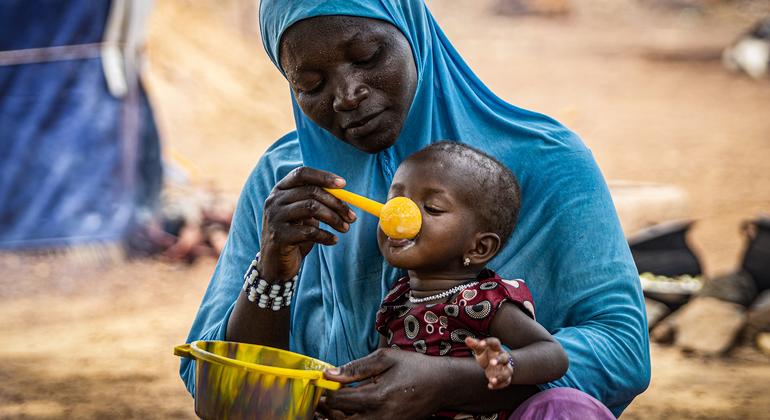Almost 55 million people are facing further food and nutrition insecurity in West and Central Africa during the region’s three-month lean season from June through August, the UN World Food Programme (WFP) said on Friday.
This is a four million increase in the number of people currently dealing with food insecurity in that region.
Mali is facing the worst situation – around 2,600 people there are presumed to be experiencing catastrophic hunger – IPC food classification index phase 5 (read our explainer on the IPC system here).
“The time to act is now. We need all partners to step up, engage, adopt and implement innovative programs to prevent the situation from getting out of control while ensuring no one is left behind,” said Margot Vandervelden, WFP’s Acting Regional Director for Western Africa.
Economic challenges and imports
The most recent data shows that economic turmoil including stagnated production, currency devaluation, increasing inflation and trade barriers have exacerbated the food crisis in Nigeria, Ghana, Sierra Leone, and Mali.
These economic challenges as well as fuel and transport costs, regional body ECOWAS sanctions and restrictions on agropastoral product flows, have contributed to a sharp increase in staple grain prices across the region – a more than 100 per cent increase over the past 5 years.
To date, cereal production for the 2023-2024 agricultural season has seen a 12 million tonne deficit while the availability for cereals per person is down two per cent compared with the region’s last agricultural season.
Currently, West and Central Africa are reliant on imports to satisfy the population’s food requirements, but economic hardship has increased the cost of imports.
WFP’s Ms. Vandervelden said these issues call for a stronger investment in “resilience-building and longer-term solutions for the future of West Africa.”
Shocking highs
Malnutrition in West and Central Africa has risen to a shockingly high rate with 16.7 million children under five experiencing acute malnutrition.
More than two thirds of households are struggling to afford healthy diets and eight out of 10 children, ranging from six to 23 months lack the consumption of foods essential to their optimal growth and development.
“For children in the region to reach their full potential, we need to ensure that each girl and boy receives good nutrition and care, lives in a healthy and safe environment, and is given the right learning opportunities,” said Gilles Fagninou UNICEF Regional Director.
Parts of northern Nigeria are also experiencing many cases of acute malnutrition in about 31 per cent of women aged 15 to 49.
Ms. Fagninou explained that strengthening “education, health, water and sanitation, food, and social protection systems,” can result in lasting differences in children’s lives.
Sustainable solutions
UN agencies the Food and Agriculture Organization (FAO), UN Children’s Fund UNICEF and WFP, are calling on national governments, international organizations, civil society and the private sector, to establish sustainable solutions to strengthen and support food security and increase agricultural productivity.
These solutions should also alleviate the adverse effects of economic volatility, they said.
There is also an expectation that governments and private sectors should join forces to guarantee the human right to food for all.
UNICEF and WFP plan to extend national social protection programs to Chad and Burkina Faso, as millions of people in Senegal, Mali, Mauritania, and Niger have benefitted from such programmes.
Additionally, FAO, agricultural development fund IFAD, and WFP have collaborated across the Sahel to expand “productivity, and access to nutritious food through resilience-building programmes.”
Dr. Robert Guei, FAO Sub-Regional Coordinator for West Africa and the Sahel, said that when responding to these cases of food and nutrition insecurity, it is essential to promote and support policies that will encourage the “diversification of plant, animal, and aquatic production and the processing of local foods”.
He said this was “crucial not only to ensure healthy, affordable diets all year round, but also and above all to protect biodiversity, with the potential to mitigate the effects of climate change, and above all to counter high food prices and protect the livelihood of the affected population”.









